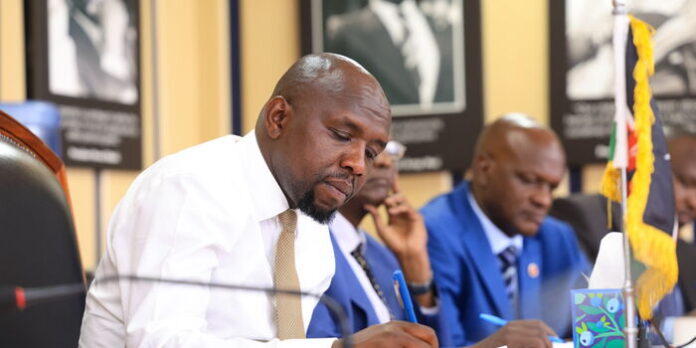National Assembly Speaker Moses Wetang’ula has announced that Members of Parliament will summon Interior Cabinet Secretary Kipchumba Murkomen next week to explain delays in the issuance of national identity cards in Northern Kenya.
Speaking on Monday, November 17, in Fafi, Garissa County, Wetang’ula raised concern over delays in the issuance of IDs to locals in Northern Kenya despite the removal of the vetting requirement for ID applicants.
The National Assembly Speaker said that CS Murkomen, whose docket oversees the National Registration Bureau, will appear before the House to explain the reasons behind the delays.
“We have been informed here today that while vetting has indeed been scrapped, there are significant delays in the production of IDs at the National Registration Bureau,” said Wetang’ula.
He continued, “Next week, I will invite the Cabinet Secretary so that we can raise these questions directly. We insist that once an individual applies for an ID, it should not take more than two weeks for them to receive it,” he said.
Speaker Wetangula emphasized that all eligible Kenyans should be able to acquire a national ID without any restrictions.
“The President gave a directive, which Parliament fully supported, that any Kenyan who has attained the legal age to acquire a national ID, whether here in Northern Kenya or elsewhere, should not face unnecessary hurdles such as vetting.
“Every eligible Kenyan should obtain the document freely and without restrictions,” Wetang’ula added.
On February 6, President William Ruto signed a decree scrapping the long-standing vetting process for national identification cards (IDs) in Kenya’s North Eastern region.
Speaking in Wajir County, President Ruto said the move is set to address historical discrimination against communities in the area.
“If it’s about vetting, let all children of Kenya be vetted equally without any discrimination. We want the people of Northern Kenya to feel equal to the rest of the country,” said Ruto.
The 60-year-old vetting requirement, which primarily affected Somali Kenyans and other communities in the region, had long been criticized as a form of systemic discrimination that subjected residents to additional scrutiny when applying for national IDs.
The vetting requirement for national IDs was introduced in the 1960s in Northern Kenya following the Shifta insurgency, a secessionist war that saw a section of local communities attempt to join Somalia.



















